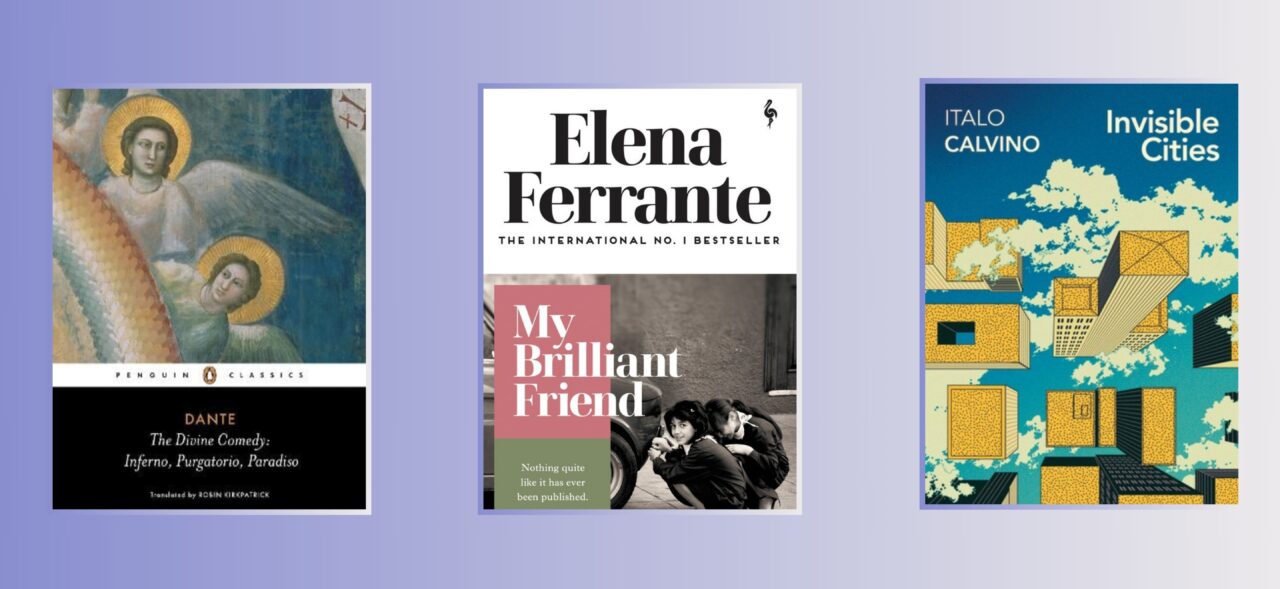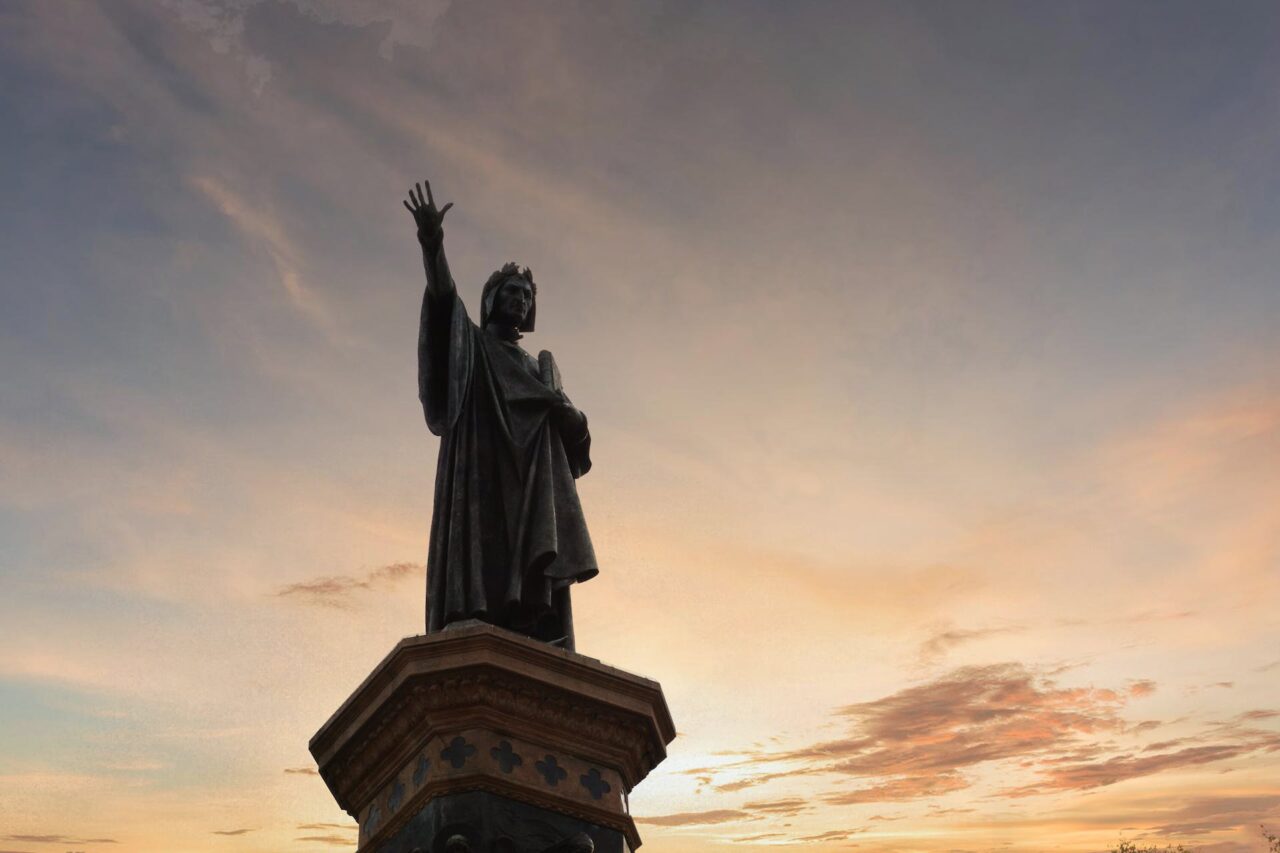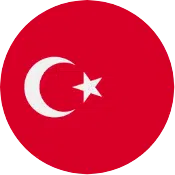
Guide to Italian Novels
Italian literature has a rich and long history, dating back to the Roman Empire. From the epic poems of Virgil to the contemporary novels of Elena Ferrante. Italian writers have always explored a wide range of themes and styles. This guide will provide you with a brief overview. It includes a list of 10 Italian books you should read. Also, some of the most important and influential Italian novels. Start your Italian literature journey and start learning Italian.

10 Captivating Italian Novels
Italy boasts a long and celebrated literary history, offering a treasure trove of captivating novels across various genres and eras. Here are 10 exceptional Italian novels to add to your reading list:
- “The Divine Comedy” by Dante Alighieri. An epic poem considered one of the greatest works of Western literature. Dante’s masterpiece will take you on a profound journey through Hell, Purgatory, and Heaven. A combination of philosophical depth, vivid imagery, and enduring influence.
- “Decameron” by Giovanni Boccaccio. A collection of 100 novellas. Set against the backdrop of the Black Death, offers a diverse range of stories. A celebration storytelling and human nature in times of adversity.
- “The Betrothed” by Alessandro Manzoni. An historical novel from the 17th-century Lombardy. “The Betrothed” is a captivating tale of love, loss, and redemption amidst political turmoil and social injustice.
- “Pinocchio” by Carlo Collodi. “Pinocchio” transcends age despite being a beloeve children’s classic. A combination of honesty, disobedience, and the yearning for self-discovery. This charming yet cautionary tale continues to resonate with readers.
- “If on a Winter’s Night a Traveller” by Italo Calvino. A unique reading experience with this postmodern masterpiece. It playfully subverts the traditional novel form. Calvino offers an engaging puzzle of interconnected stories and literary references.
- “The Leopard” by Giuseppe Tomasi di Lampedusa. An opulent yet fading world of a Sicilian aristocratic family in the 1860s. “The Leopard” is a poignant historical novel. This book explores themes of change, loss, and the complexities of social transformation.
- “My Brilliant Friend” by Elena Ferrante. The first book of the Neapolitan Novels tetralogy. “My Brilliant Friend” delves into the deep and complex friendship between two women. From their childhood until the current days. A captivating exploration of female relationships, societal pressures, and personal growth. Also a TV series on streaming services.
- “The Solitude of Prime Numbers” by Paolo Giordano. Two lonely souls, Alice and Mattia, find solace and connection in each other’s pain and vulnerabilities. This lyrical novel is a poignant reflection on isolation, human connection, and the search for belonging.
- “The Eight Mountains” by Paolo Cognetti. This novel explores the relationship between a young man and the majestic Italian Alps. A captivating meditation on nature, family, and finding one’s place in the world. Winner of the prestigious Strega Prize.
- “Invisible Cities” by Italo Calvino. A journey through a series of imaginary cities. Each city has its unique characteristics and symbolic meanings, in this thought-provoking novel. A philosophical exploration of urban space, memory, and the human imagination.
Italian literature offers countless other novels waiting to be discovered. From different genres to contemporary authors. There is plenty to explore.
Sign up for our offers
Exclusive discounts on your course with Cactus directly on your inbox!
Early Italian Literature: A Journey through Poetic Expression
Dante’s “Divine Comedy” stands as a monumental peak in the 14th century. Despite that the roots of Italian literature run deeper, reaching back to the 13th century. A period of fascinating transition from Latin to the vibrant dialects spoken by the Italian people. This nascent vernacular literature explored diverse themes and forms. The groundwork for the literary gems that would follow.
One significant thread emerged with the “Canticles“. Religious poems praising God through nature’s wonders. St. Francis of Assisi’s “Canticle of the Sun” exemplifies this genre. A rhythmic prose resonating with the Psalms of the Bible.
Epic narratives also flourished in this early period. Works like “Ritmo Cassinese” and “Canzone di Rolando” adapted French chansons de geste into the Italian vernacular. These epics celebrated courage and adventure. Whilst incorporating elements of satire and social commentary. These early Italian writers laid the foundation for a rich and distinctive literary tradition.
Vibrant Contemporary Italian Literature
Contemporary Italian literature reflects the dynamic cultural landscape and societal shifts of Italy. A in the 20th and 21st centuries. From the post-World War II period marked by neorealism to the present day. Italian authors have grappled with themes exploring personal and societal issues. From identity and migration to globalization and the impact of technology. A reflex of Italy’s complex past and evolving present. Writers such as Elena Ferrante have gained international acclaim for their compelling narratives. The “Neapolitan Novels” captivated readers with intimate, and at times brutal, narratives.
Contemporary Italian literature encompasses a diverse array of voices. The topics include those of immigrants and marginalized communities. Nuanced perspectives on the multicultural fabric of modern Italy. Authors such as Amara Lakhous and Igiaba Scego explore themes of diaspora, cultural hybridity, and the quest for belonging. Both shed a light on the experiences of Italians with diverse backgrounds. Meanwhile, emerging writers continue to push boundaries with experimental forms and innovative storytelling techniques.
A glimpse into the vast and dynamic world of modern Italian literature. All contributing to a vibrant literary scene.

Most Important Italian Novel
Determining the “most important” Italian novel is a complex question. With so many great works and authors, it’s not easy to determine. Depending on the topic, from historical impact to critical acclaim, each has it’s place on this list. However, we will list a few that you might want to consider from the list above to start reading. Most important Italian Novel(s):
By Historical Impact:
• “The Divine Comedy” by Dante Alighieri. For its lasting influence on Italian language, literature, and philosophy.
• “The Betrothed” by Alessandro Manzoni. A major contender for its role in unifying the Italian language and shaping national identity.
By Literary Innovation:
• “Decameron” by Giovanni Boccaccio. For its impact in the vernacular literature and pioneering short story.
• “If on a Winter’s Night a Traveler” by Italo Calvino. A work pushing the boundaries of storytelling with its playful metafictional structure.
By Cultural Resonance:
• “Pinocchio” by Carlo Collodi. A story that continues to captivate readers across generations with its timeless themes.
• “My Brilliant Friend” by Elena Ferrante. Internationally acclaimed for its exploration of topics in the Neapolitan society.
By Critical Acclaim:
• “The Leopard” by Giuseppe Tomasi di Lampedusa. Widely praised for its masterful storytelling, evocative historical setting, and exploration of societal change.
There are countless other Italian novels that could be considered important. In the end, the best way to appreciate Italian literature is to explore it yourself. Understand what topics resonate with you and start exploring a bit further.

Non-Fiction Italian Books
There also some other important works that you might want to consider. Some of the non-fiction Italian books had a great impact in international literature. “If This Is A Man” by Primo Levi is one of the best examples. A profound memoir detailing his experiences in Auschwitz. Poignant reflections on humanity and survival. There is also “Gomorra” by Roberto Saviano. A book that exposes the inner workings of the Camorra. A chilling portrayal of Naples’ underworld and its global reach.
Further Reading About Italian Novels
If you are interested in learning more about Italian literature, below some resources:
- The Italian Cultural Institute
- Project Gutenberg
- The Digital Dante Project
- 10 of The Best Novels Set in Italy
- Best Italian Learning Books
Next Steps to Learn Italian
Most people are drawn to learn Italian because of their interest in Italian culture. From great Italian novels to delicious food, there is much to discover. Reading Italian novels can be a great resource to improve your Italian language skills. Are you interested in improving your Italian language skills? Start learning Italian with Cactus! We offer online Italian classes, in-person classes across the UK or private Italian classes. Choose the course the Italian course that suits you best!

 French
French German
German Italian
Italian Spanish
Spanish Arabic
Arabic Cantonese
Cantonese Czech
Czech Croatian
Croatian Danish
Danish Dutch
Dutch English
English Greek
Greek Hebrew
Hebrew Hindi
Hindi Japanese
Japanese Korean
Korean Norwegian
Norwegian Polish
Polish Portuguese
Portuguese Russian
Russian Swedish
Swedish Thai
Thai Turkish
Turkish Ukrainian
Ukrainian